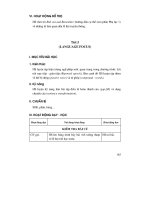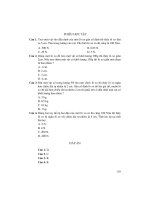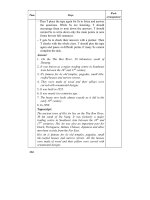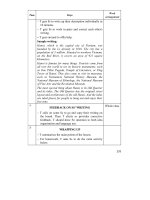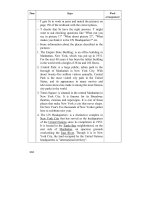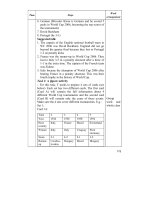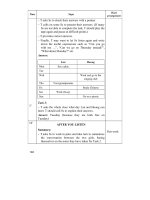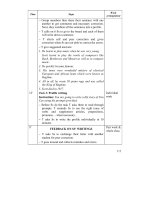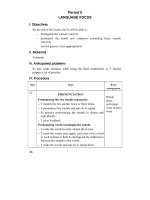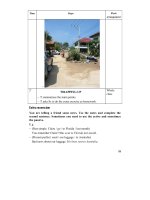Thiết kế bài giảng tiếng anh 10 tập 1 part 7 ppt
Bạn đang xem bản rút gọn của tài liệu. Xem và tải ngay bản đầy đủ của tài liệu tại đây (296.15 KB, 23 trang )
139
Growing from its 1833 founding as a frontier town of the Old Northwest into
one of the world's premier cities, Chicago is ranked as one of 10 "Alpha"
(most influential) world cities. Chicago today is the financial, economic, and
cultural capital of the Midwest. The city is recognized as a major
transportation, business, and architectural center of the United States. The
city's skyscrapers, local cuisine, political traditions, and sports teams are some
of its most recognized symbols.
A resident of Chicago is referred to as a Chicagoan. Typically, residents of
Chicago will identify themselves with one of the many neighborhoods of
Chicago. African Americans form a plurality in the city (just under two-fifths),
about one-third are Caucasian, around a quarter Hispanic and one-twentieth
Asian, with small amounts of other groups filling in the remainder. Chicago
also has several dozen distinct neighborhoods to match its ethnic diversity; the
city is divided into 77 community areas, identified in the 1920s by the
University of Chicago.
Period 3
(Listening)
I. Aim
Listening to a short talk about a picnic
II. Objectives
By the end of the lesson, Ss will be able to improve their listening skill
through Ordering, Gap-filling and Answering questions exercises.
III. Materials
Textbook, cassette,…
IV. Anticipated problems
Ss may have difficulty in doing Ordering exercise.
140
V. Procedure
Time Steps
Work
arrangement
7’
Warm-up
Find someone who
Prepare a two-column table with Yes/No questions
and Name.
Let Ss go around the class and ask other Ss what
they used to do when they were small. If the answer
is YES, write his/her name in the table.
The winner is the first one who completes the Name
column.
Do you… Name
like to go for a picnic?
go with your friends/family?
always go to the beach for a picnic?
always go to the mountain for a
picnic?
bring food with you when you go for a
picnic?
….
Whole class
7’
Before you listen
Q&A
Ask Ss to work in pairs and discuss the following
questions:
Do you often go for a picnic?
When is the most important time for a picnic?
Why do people go for picnics?
Whole class
141
Gather ideas from some pairs and introduce some
important vocabulary in the listening.
Vocabulary pre-teach
glorious (a): beautiful, shining (đẹp trời)
assemble (v): gather (tập hợp)
destination (n): a place to which a person is going to
(điểm, đích đến)
left-overs (n): the rest (thức ăn còn thừa)
delicious (a): tasty (ngon miệng)
Botanic Garden (n): (translation) Vườn Bách Thảo
spacious (a): large, have a lot of space (rộng,
nhiều không gian)
sleep soundly (v): to be in deep sleep (ngủ say)
Checking technique
Ordering vocabulary
Write all the new words on the board.
Make sentences which contain the new words
randomly.
Read the sentences aloud.
Ask Ss to write down the words they hear in order 1,
2, 3, …
6’
While you listen
Set the scene:
You are going to listen to a short talk by a student
about his picnic with classmates. You listen to the
tape and do the tasks followed.
Task 1 - Pictures Ordering
Ask Ss to work in pairs and study the pictures
carefully.
Make sure Ss have ideas about the pictures and they
can tell the differences among them.
Pair work
142
7’
7’
Have Ss listen to the tape and number the pictures in
the order they hear. Let Ss do the task in pairs.
Play the tape more than once if necessary.
Call on some Ss to explain their answers in front of
the class.
Feedback and give correct answers:
1. a 2. e 3. b
4. c 5. f 6. d
Task 2 - Gap-filling
Ask Ss to listen to the tape again and fill in the
blanks with exact words they hear.
Tell Ss to read the sentences carefully and have a
guess of the missing words first.
Play the tape several times if necessary.
Ask Ss to compare their answers with a friend.
Call on some Ss to read aloud their answers in front
of the class.
Check the exercise in front of the class as a whole.
Give correct answers:
1. The weekend picnic I enjoyed most was just a
few weeks ago.
2. My class decided to pay a visit to the Botanic
Garden.
3. We assembled at the school gate on time.
4. We made a short tour round the garden.
5. In the afternoon we went on playing some more
games.
Task 3 - Answering Questions
Play the tape again and ask Ss to answer the
questions independently.
Have Ss compare their answers with a friend.
Individual
work
Individual
work
143
Call on some Ss to read aloud their answers in front
of the class.
Feedback and give correct answers:
1. The weather was very nice.
2. Yes, it was.
3. The garden was beautiful.
4. They could sleep soundly because it was so
peaceful and quiet in the garden.
5. They took pictures, played games, talked,
sang and danced.
Tapescript
The weekend picnic I enjoyed most was just a few
weeks ago. My class decided to pay a visit to the
Botanic Garden.
It was a glorious Sunday. We assembled at the
school gate on time and travelled to the Botanic
Garden by bus. It was a long way to our destination
and we sang merrily all the way.
The Botanic Garden was a very beautiful place. We
made a short tour round the garden and took some
pictures of the whole class. Then we played a lot of
games on a spacious piece of grassland. One of the
boys brought along his guitar and we sang our
favourite songs. We laughed, talked and danced,
too. After a delicious meal with various kinds of
food that we brought, we all took a rest. Some of us
slept very soundly because it was so peaceful and
quiet there. In the afternoon, we went on playing
some more games. Then we packed up the left-overs
and started home. We all felt happy.
8’
After you listen
Group work project
Ask Ss to work in groups of three to four and map
out the plan for the picnic this weekend.
Group work
144
The plan include:
Destination:
Means of transport:
How many:
How long:
Who with:
What activities:
Bring any food?
…
Go around the class and provide help if necessary.
If time allowed, call on some groups to talk about
their plan in front of the class.
Comment and make necessary corrections.
3’
Wrapping
Summarise the main points.
Assign homework.
Whole class
Supplements
Exercise
Fill the blank with the most suitable word.
1. The Prime Minister will
. . . . . . . . an official visit to China at the
invitation of the Chinese counterpart.
2. We gathered at the school
. . . . . . . . for the picnic.
3. After the tiring trip, we came back home and slept very
. . . . . . . .
4. We
. . . . . . . . a lot of pictures during the trip.
Answers:
1. pay
2. gate
3. soundly
4. took
145
Period 4
(Writing)
I. Aim
Writing a confirmation letter
II. Objectives
By the end of the lesson, Ss will be able to write a confirmation letter
responding to a request and an invitation.
III. Materials
Textbook, whiteboard markers,…
IV. Anticipated problems
Ss may not be familiar with confirmation letters.
V. Procedure
Time Steps
Work
arrangement
5’
Warm-up
Jumbled words
Divide the class into small groups.
Give each group one card containing 10 words
whose letters are jumbled.
Ask Ss to rearrange the letters to make good words.
The group which finishes the task first with the
most correct words will be the winner.
E.g:
1. ubsutnrn ⎯⎯→ sunburnt
2. cpinci ⎯⎯→ picnic
3. snisksecs ⎯⎯→ sickness
4. pdccouie ⎯⎯→ occupied
5. …
Group work
146
7’
Presentation
Explain the definition of request and confirmation
letters.
Request is the letter that asks for information or
help.
Confirmation is the letter that responds to the
request. It confirms whether the help is provided or
the information is available or not.
Task 1- Finding Requests and Confirmation
Ask Ss to work in pairs: Read the two letters below
and find the requests in Nga’s letter and
confirmation in Hoa’s.
Tell Ss to underline the structure showing requests
and confirmation.
Call on some Ss to explain their answers in front of
the class.
Feedback and give suggested answers:
Request: Can you go shopping with me to buy the
things we need for the trip?
Confirmation: Certainly, I will help you to prepare
everything you need for the trip.
Call on two Ss to read the letters aloud in front of
the class.
Further explain the format and structures used in the
letters.
Whole class
15’
Practice
Task 2 - Writing Confirmation
Ask Ss to read the situations carefully and find the
requests in both of them.
Make sure Ss get the requests clearly:
Individual
work
147
Lan asks you to buy some fruits and bring them to
her house.
Minh wants to borrow you a book about wildlife.
Tell Ss to choose one of these situations to write a
confirmation letter responding to each of them.
Ask Ss to exchange their writing with a friend.
Introduce peer correction.
Pick up some writings to check in front of the class
as a whole.
Give suggested answers:
1
Dear Lan,
Firstly, let me congratulate you on your 15
th
birthday. Certainly, I will help you to prepare
everything you need for the party. I will go to the
nearby market and get them on Saturday morning.
Luckily, Saturday is weekend so I have the whole
day free.
I will be at your house at 6.30 p.m on Saturday.
Love,
2
Dear Minh,
I’m happy to tell you that the book you want to
borrow is available. You can use this for the next
two weeks. However, I will not be at home this
Saturday. Can you come on Sunday? I will be
waiting for you all day.
See you then,
Yours,
148
15’
Further practice
Mistakes correction
Ask Ss to work in pairs.
Give out a confirmation letter which contains 10
mistakes. Ss have to find out the mistakes and
correct them.
Dear Hao,
I receives your letter requests the details of the
apply form for the video library. I enclose here the
full form and you ask to fill out before send back to
us. You can send we via e-mail or by air-mail. The
deadline is 25
th
July. You should remember
attaching a photo on the first page of the form. The
membership fee are $ 25 per year and it is not
refund if you leave the library for any reasons.
I am looking forward to hear from you soon.
Yours truly,
Director
Answers:
Dear Hao,
I receives your letter requests the details of the
apply form for the video library. I enclose here the
full form and you ask to fill out before send back to
us. You can send we via e-mail or by air-mail. The
deadline is 25
th
July. You should remember
attaching a photo on the first page of the form. The
membership fee are $ 25 per year and it is not
refund if you leave the library for any reasons.
I am looking forward to hear from you soon.
Yours truly,
Director
Mistake correction
1. receives ⎯⎯→ have received
2. requests ⎯⎯→ requesting
Pair work
149
3. apply ⎯⎯→ application
4. ask ⎯⎯→ are asked
5. send ⎯⎯→ sending
6. we ⎯⎯→ us
7. attaching ⎯⎯→ to attach
8. are ⎯⎯→ is
9. refund ⎯⎯→ refundable
10. hear ⎯⎯→ hearing
3’
Wrapping
Summarise the main points.
Assign homework.
Whole class
Supplements
Exercise
Match the verbs in A with a word or phrase in B.
A B
1. stay a. excursions or trips
2. send b. a car
3. look round c. sightseeing
4. hire d. the museums and art galleries
5. go e. some postcards
6. go on f. some souvenirs
7. take g. in a hotel or guest house
8. buy h. some photos
Answers:
1. g 2. e 3. d
4. b 5. c 6. a
7. h 8. f
150
Period 5
(Language focus)
I. Aim
Distinguishing the sounds /ə/ and /з:/
Reviewing the present progressive (with a future meaning) and be going
to
II. Objectives
By the end of the lesson, Ss will be able to:
- pronounce the sounds /ə/ and /з:/ correctly
- distinguish the present progressive (with a future meaning) and be
going to and use them appropriately.
III. Materials
Textbook, whiteboard markers,…
IV. Anticipated problems
Ss may confuse the present progressive (with a future meaning) and be
going to.
V. Procedure
Time Steps
Work
arrangement
10’
Warm-up
Find someone who
Prepare a two-column table with Yes/No questions and
Name.
Let Ss go around the class and ask other Ss what they
used to do when they were small. If the answer is YES,
write his/her name in the table.
The winner is the first one who completes the Name
column.
Whole class
151
Are you going to… Name
take an English class in the evening?
spend summer holiday on the beach?
watch the game show Who wants to be
millionaire on VTV3?
go to the cinema?
…
5’
Pronunciation
Presentation 1
Demonstrate the sounds /ə/ and /з:/ by pronouncing
them clearly and slowly.
Help Ss to distinguish these two sounds.
Instruct the way to pronounce:
/з:/ first pronounce the sound /ə/ then put your tongue
forward and up a little.
/з:/ is a long sound.
/ə/ first pronounce the sound /з:/ but make it short.
/ə/ is a short sound
Whole class
5’
Practice 1
Play the tape and ask them to repeat.
Call on some Ss to repeat the sounds clearly in front of
the class.
Ask Ss to work in pairs and practice the sentences.
Introduce peer correction.
Go around the class and provide help if necessary.
Pair work
5’
Grammar and vocabulary
Presentation 2
Explain Future forms
Whole class
152
Will
Will expresses an intention or decision made at the
moment of speaking:
I’ll give you my phone number. Ring me tonight.
Going to
Going to expresses an intention or decision thought
about before the moment of speaking. It expresses a
plan:
We’re going to have a holiday in Sam Son this
summer.
It also expresses a prediction:
Look! It’s going to rain.
Present progressive
The present progressive can be used to express a future
arrangement between people. It’s common with verbs
such as go, come, see, visit, meet, have (a party), leave
5’
Practice 2
Ask Ss to do exercise 2: Choose the correct option in
bracket.
Have Ss compare and discuss the answers with a
friend.
Call on some Ss to read and explain their answers in
front of the class.
Feedback and give correct answers:
1. Tell me your plan, Lan. What are you doing
this Saturday evening?
2. Mary is getting married next week.
3. There’s a good play on TV tonight. Are you
going to watch it?
4. I feel terrible. I think I am going to be sick.
5. There are a lot of black clouds in the sky. It is
going to rain.
Individual
and Pair
work
153
5’
Practice 3
Let Ss further practice using the present progressive
and be going to by asking them to do exercise 2: Put
the verbs in brackets in the present progressive and be
going to.
Ask Ss to compare their answers with a friend.
Check the exercise 2 in front of the class as a whole.
Give correct answers:
1. The Browns are going to the cinema this
evening.
2. We are having an English-speaking club
meeting next week. Would you like to come?
3. The cat is just behind the rat. It is going to
catch the latter.
4. Where are you putting this new bookcase?
5. Smoking is very bad for his health, but he is not
going to give it up.
Individual
work
5’
Practice 4
Ask Ss to do exercise 3 in pairs: Complete the
exchanges, using the present progressive or be going
to.
Call on some pairs to act out the exchanges in front of
the class.
Make necessary corrections.
Give correct answers:
1. There’s a football match on TV this afternoon.
Are you going to see it?
No, I’m busy. I’m doing my homework.
2. Can you come next weekend?
Sorry, we’d love to, but we are visiting our
grandparents.
Pair work
154
3. I hear Tim has won a lot of money. What’s he
going to do with it?
He says he’s going to buy a new motorbike.
4. Should I leave the umbrella at home?
It’s cloudy and windy. It’s going to rain soon.
Take it along.
5. Do you think the windows so dirty?
Oh, yes. I’m going to clean them later.
Test yourself B
Answers to Test yourself B
Listening
Reading Oxford
Location
1. 50 miles to the west of
London
6. in central England
Population
2. 120,000 people 7. 90,000 people
Noted for
3. market town
4. biscuit factory
5. computer industry
8. university
9. car factory
10. Cowley Road
Tapescript
We start our journey in Reading. This town lies about 50 miles to the west of
London in the county of Berkshire. It is a medium-sized town of about
120,000 inhabitants. In times gone by Reading was just a market town best
known for its Huntley and Palmers biscuit factory. Now it is at the heart of
the computer industry in the UK and is expanding rapidly. Computer
companies everywhere. It’s not a very pretty town, but one which says a lot
about England.
Oxford is most definitely prettier. It is located in the central England. It has a
population of about 90,00, of which a large number work in or for the
155
university. This is obviously what the city is famous for, but in terms of
getting to know the country, what is really of interest is the British Leyland
car factory at Cowley. This is huge, employing about 20,000 people, yet,
because of the university, it is usually forgotten. Spend a day looking round
the works, seeing how they make the cars. Fascinating. Or stroll up the
Cowley Road and watch the world walk with you.
Reading
1. F (Teachers give too much homework.)
2. F (They say that it is unnecessary for children to do work at home in
their free time.)
3. T
4. F (Students have to repeat tasks which they have already done at
school.)
5. T
Grammar
Missing words
Today a lot of important inventions/carried out/
scientists working for large industrial firms.
However, there are still opportunities/ other people to
invent various things. In Britain, /is a weekly
television programme /attempts to show all /various
devices which people have recently invented. The
people organizing /programme receive information
about 700 inventions /year. New ideas can still be
developed /private inventors. However, is important
to consider these questions: Will it work? Will it
/wanted? Is it new?
0. are
1. by
2. for
3. there
4. which
5. 5. the
6. the
7. a/per
8. by
9. it
10. be
156
Writing
Suggested answer:
654, Truong Chinh Steet, Hanoi.
8
th
, June, 2006
Dear Hung,
Our class are planning to have a three-hour visit to a factory as part of our
technology lesson. I am writing to ask you for permission to visit your
computer factory as it is near our school so we can go by bicycle. Forty-five
members of our class will arrive at your factory at 7:30 on Monday, 22
nd
December, 2006.
Would you be so kind as to recommend someone who can give us a tour
around the factory? We would so much like to know how computers are made
and we also like to talk with the workers there. We hope that you will create
favorable conditions for us to have an interesting and useful visit to your
factory.
We are looking forward to receiving your reply soon.
Yours sincerely,
Nghiem Danh Hao
157
Unit 7
The mass media
Period 1
(Reading)
I. Aim
Reading TV programme schedules
II. Objectives
By the end of the lesson, Ss will:
- be updated with names of some popular TV progammes such as
Quiz Show, Portrait of life…
- be able to talk about their favourite programmes.
III. Materials
Textbook, whiteboard markers…
TV schedules extracted from newspapers
IV. Anticipated problems
Ss may have difficulty in understanding some names of TV programmes.
V. Procedure
Time Steps
Work
arrangement
5’
Warm-up
Jumbled words
Give 10 words whose letters are in the wrong order.
Note Ss that all the words are forms of mass media.
Ask Ss to work in groups and rearrange them in
good order to make the right words
Group work
158
1. enslieisov ⎯⎯→ television
2. rwepeapns ⎯⎯→ newspaper
3. idora ⎯⎯→ radio
4. agenmiza ⎯⎯→ magazine
5. …
Explain the term mass media.
Mass media or mass communications refer to
public institutions that report news and other
stories. Mass media also keep people updated.
Give examples for each type of mass media.
E.g:
Newspaper: Nhan Dan, Lao Dong…
10’
Before you read
Have Ss work in pairs: Ask and answer the
following questions:
When do you often watch TV?
How many channels are there in our national TV?
How many hours per week do you watch TV?
Gather ideas and give some background
information about TV channels in Vietnam (See
Supplements for more information):
VTV1: combination of Politics, Economics and
Entertainment
VTV2: Science and Education
VTV3: Entertainment
VTV4: For the overseas Vietnamese
VTV5: For the Ethnic minority groups
Vocabulary pre-teach
Give Vietnamese equivalences for some TV
programmes
Whole class
159
Population and Development: Dân số và Phát triển
TV Series: Phim truyền hình dài tập
Folk songs: Dân ca nhạc cổ
News headlines: Điểm tin chính
Weather Forecast: Dự báo thời tiết
Quiz Show: Trò chơi truyền hình
Portrait of Life: Chân dung cuộc sống
Documentary: Phim tài liệu
Wildlife World: Thế giới thiên nhiên hoang dã
Around the World: Vòng quanh thế giới
Checking technique
Advising
Divide the class into two teams. Team A says what
they want to see. Team B gives advice on what
programmes team B should watch.
E.g:
Team A: I love seeing animals and plants.
Team B: You should watch the Wildlife World.
Team A: I want to know whether it is going to rain
tomorrow.
Team B: You should watch the Weather Forecast.
….
6’
While you read
Task 1 - Matching
Ask Ss to read three TV programme schedules and
do Task 1: Match the words in A which appear in
the reading passage with their definitions in B.
Have Ss compare and discuss their answers with a
friend.
Further explain and give correct answers:
1. c (A cartoon is a film made by photographing
Individual
work
160
7’
7’
a series of changing drawings)
2. a (A drama is a play for the theatre,
television or radio)
3. d (A comedy is a film or a play that is
intended to be funny, usually with a happy
ending)
4. b (A documentary is a film or a television
programme giving facts about something)
Task 2 – True or False
Tell Ss to read the programmes carefully and
decide whether the statements are true (T) or false
(F). Correct the false information.
Ask Ss to explain their answers by giving evidence
in the reading passage.
Check the answers in front of the class as a whole.
Give correct answers:
1. T
2. T
3. F (The Nature of Language is the
documentary programme at 15:15 on
VTV3.)
4. T
5. F (VTV1 starts at 5:35 and the last
programme starts at 23:30.)
Task 3 – Answering Questions
Ask Ss to work in pairs and ask and answer the
questions in the book basing on the information in
the reading passage.
Call on some pairs to ask and answer in front of
the class.
Feedback and give correct answers:
1. There are five films on.
Individual
work
Pair work
161
2. At 9:00 a.m., 12:00 at noon, 7:00 p.m., 11
p.m. on VTV1 and 7:00 p.m. on VTV3
3. VTV2
4. The Quiz Show
5. (You should watch) VTV1
6. The Football
7’
After you read
Keep Ss in pairs and ask them to tell their partner
about one of the TV programmes they like
watching best and explain why.
Call on some Ss to give short talks on the given
topic.
Give suggested answers:
I like Game show The price is right most because
it is very interesting, easy to play. Besides the
reward for the winner is valuable. Another reason
I like this game show is the MC. Mr. Luu Minh Vu
is humorous and very intelligent…
Pair work
3’
Wrapping
Summarise the main points.
Assign homework.
Whole class
Supplements
1. Names of some popular programmes on VTV
Rush Hour: Giờ cao điểm
Sing to learn: Học Tiếng Anh qua các bài hát
Game Shows: Wheel of Fortune (Chiếc nón kỳ diệu)
Trò chơi Who wants to be millionaire? (Ai là triệu phú)
truyền hình The price is right (Hãy chọn giá đúng)
One vs one hundred (Đấu trường 100)
Who is who? (Ai là ai?)
